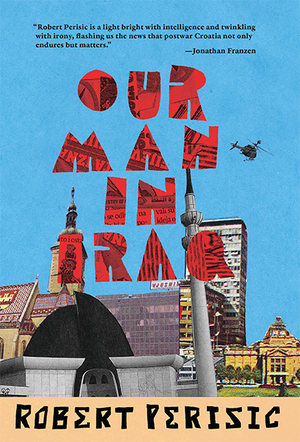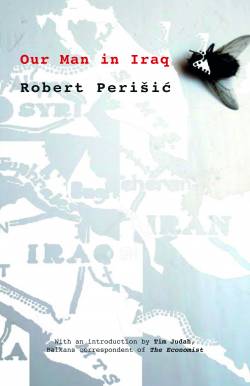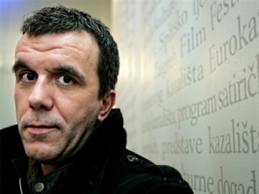When your first book in the U.S. comes out with a front cover blurb from Jonathan Franzen, you’re usually in a pretty good spot. That’s where Croatian author Robert Perišić finds himself with the fine, just-released novel Our Man in Iraq, one of the first offerings from the relatively new press Black Balloon Publishing.
(The U.K. edition of the novel was published by Istros Books in 2012 and the original, Naš čovjek na terenu in Croatian, came out in 2007.)
I don’t like to use the word “rollicking” to describe fiction because it feels so pandering, but Our Man in Iraq does indeed rollick as it follows Toni, a newspaper editor in the capital city of Zagreb with a sexy actress girlfriend and an increasingly complicated problem: he has sent his somewhat unhinged cousin Boris to Iraq to cover the American “shock and awe” campaign of 2003. When Boris goes missing, Toni’s life starts to unravel—leading to an ill-fated attempt at impersonation and other misadventures.
While on the surface this is a satirical novel in the Eastern European tradition, it is—like all good books—many things. It’s an exploration of a Croatian society adrift as it figures out where it stands in the dog-eat-dog world of globalized economy, as well as a portrait of a man who suddenly finds that the imaginary buffer he felt between himself and the modern world is gone. Perišić and I had a very robust electronic conversation about the book, so in the interest of space I’ll stop my introduction and let him talk. Our Man in Iraq also has an expansive website that’s well worth checking out—as is the novel itself.
Steven Wingate: Your biographical information suggests that your original training and writing experience is in journalism. Can you talk about moving from journalism to fiction? Why did you make the jump, and do you still practice both? What roles do they play in your writing life, and have those roles changed for you lately?
Robert Perišić: The thing is a bit more complicated than that. I was primarily interested in literature and I got a degree in literature. As I spent a long time studying, I started to work for newspapers to earn a living, which I continued, making a name for myself along the way. So there was no “turning point.” Literature was always there, and journalism served to finance literature, because in Croatia—which is a very small market (4.5 million people)—it’s impossible to live off book sales even when you’re famous. If you sell 5,000 copies, it’s a bestseller and, proportionally, it’s like selling 330,000 copies in America.
But in Croatia you can’t survive off that, nor can you have a bestseller every year, especially if your goal isn’t to write bestsellers. Anyway, journalism is still my backup. On the other hand, considering literature came first to me, I never fully dedicated myself to journalism. I remained a freelancer—so the situation of the main character in the novel, who works in a newsroom, was never my situation. Some people thought it was an autobiographical experience, which I took as a compliment, because it means things looked convincing.
I’ve got a love-hate relationship towards journalism. It steals time away from literature, because after all it’s similar work, and after sitting over a journalistic text it’s hard to get back to literature straight away. You have to take a break to refresh your mind, and it often happens that just when you’ve come back to the literature you’ve been working on, you have to stop in a couple of days and write for the newspaper. I have to say, it drives me quite mad. It’s like a perpetual coitus interruptus.
On the other hand, journalism nevertheless trains you in writing, especially in getting rid of excess. When you cut things down by a fifth, they usually become more compact. I learned to use that in literature as well. Also, I can slide from an “objective” point of view to a “subjective” one. There are several styles in the novel, sometimes they seamlessly intertwine, and sometimes you can clearly see the difference when I want the voices of different states of consciousness, different narrative positions, to be separate: somebody speaks completely from themselves (like Boris from Iraq), while there are different variations in Toni’s voice—from a “subjective” to an “objective” tone.
 In terms of craft—the day-to-day activities of getting stories lined up and on the page—what has carried over from one mode to another? Was there anything that you had to teach yourself completely from scratch in writing fiction?
In terms of craft—the day-to-day activities of getting stories lined up and on the page—what has carried over from one mode to another? Was there anything that you had to teach yourself completely from scratch in writing fiction?
There were a lot of situations like that. As for the novel, it’s a big risk for me, because initially, all I have is the basic outline and in a way I don’t know if the story will come together in the end. There were novels I gave up on. When I was doing Our Man in Iraq, large parts of the plot weren’t at all settled. I was often letting the material guide me. There were also a lot of wrong directions, which I later erased. Even when I think of a certain plot, very often during writing I get to the point where I have an idea I hadn’t planned at all, because I can see it’s better that way. I find it boring to write if all I’m doing is fulfilling a plan. So it’s a constant fiddling with nothing, with the unknown.
As for technical problems, time was a big issue for me because the main part of the novel happens in five days, which is a problem because it’s in first person. The protagonist has to be the witness, and all the while there are several storylines that have to be synchronized. For that I had to use an enormous piece of paper with all the events written on it. When I realized how to wrap up the story, I also realized I had to move some events from day two to day five, which then moved some other things from day three to day four, etc.
I also had to look at the lives of these characters, most of whom are young to middle aged, and to look at the society somehow from the outside. How do you even describe all that mess? It’s not a regular society, but an inconstant society going through changes after socialism. Then there is the war, as well—a society whose form eludes the eye. When you set a novel in America, thanks to a mountain of preceding narratives you know more or less in what kind of society the story is taking place. But while writing this novel, I understood that when you come from a society like this and you’re writing a social novel, you can’t just run out onto the field and start playing. You have to compose the playing field and explain what kind of sport is being played here. In any case, there was a lot of this starting from scratch.
About twenty pages from the end of the novel, I had the feeling that Toni would bounce back somehow, and it reminded me of Jaroslav Hašek’s The Good Soldier Švejk, who is an ultimate literary survivor. It made me wonder what writers have influenced your fiction, both growing up and in more recent years.
There was a lot of it. In the formative period, say, the brilliant Croatian novelists Miroslav Krleža and Ranko Marinković. When I was focused on the short story I read a lot of Raymond Carver and Flannery O’Connor, learning precision and a succinct poetic. Gogol is important to me, that grotesqueness of his that’s occasionally truly funny; his social satire isn’t just bitter, but it turns into an all-encompassing laughter at skewed life. I hope I managed to evoke that kind of laughter in some scenes of the novel. In my younger days, I learned a lot about humor—and literature that’s not burdened by the fact it’s literature—from Americans like John Fante, Charles Bukowski, and Hunter S. Thompson. With Franzen’s The Corrections, for example, I saw how he simultaneously has an ironic distance and an emotional attachment to his protagonist, who was generationally close to me.
My desire is to go beyond irony and satire, because I often find them to be one-dimensional, too pointed and negative. I want to draw the “I” into laughter, gradually melt it down in laughter, melt the modern narcissism of the “I” that so rarely admits: I, I myself am funny! If I have to give it some thought, my desires are a bit funny, and their failure is pretty damn funny. A certain awareness of that is written into Toni’s narration, and social and political criticism are intertwined with it. I would find mere social critique boring. But we also have his social ambition, which, like any social ambition, is a bit ridiculous when you admit to it. He talks about it a lot, about the ambitions he’s forced to have to keep up with his love. These are the omnipresent moments of modern life that nevertheless haven’t been described that much—literature often doesn’t know what to do with them, because they’re actually anti-romantic. It’s all a bit uncomfortable and somewhat silly, and Toni knows it. It’s very important for this novel. That’s why the failure scenes are funny.
Because of its title, many in the U.S. will want to classify Our Man in Iraq as a war novel. But it didn’t strike me as one, especially since no “live” scenes take place in the country. The war feels more like a transformational force, not only in Croatia but also worldwide. How would you describe the role of the war in this book?
 I wouldn’t call the novel a war novel either; that story is just a part of it. The “transformational force” bit is very well said. Technically, the Iraq War serves to move the story forward, but also backwards in time, to the traces of war in Croatia, which is still fresh in the mind of Boris. As for the war, I was led by the desire to give a different kind of narrative, while all the political connotations were just there on the sidelines. The starting idea for the novel went precisely from a literarily different description of war.
I wouldn’t call the novel a war novel either; that story is just a part of it. The “transformational force” bit is very well said. Technically, the Iraq War serves to move the story forward, but also backwards in time, to the traces of war in Croatia, which is still fresh in the mind of Boris. As for the war, I was led by the desire to give a different kind of narrative, while all the political connotations were just there on the sidelines. The starting idea for the novel went precisely from a literarily different description of war.
We mostly read about war in a kind of “clear” way, as if the author finds it all stable and framed, everything lined up, like there’s a stable governance of grammar here. I remember thinking that’s not it, that’s too soothing, that’s a lie—it gives the reader the impression that the world remains in its boundaries and you haven’t lost the ground under your feet. I was interested in a different discourse, a different language. Above all, chaos. Chaos in the head, chaos in the field, all that continuing shock. There’s no readability—you’re in there, you’re not an unmanned drone.
That’s what the novel started from, from this idea about the psychedelia of war. Then I thought about how to wrap around that a story about the “normal” world, which believes in its own stability, and then juxtapose the two. The basic outline of the novel was to have that military psychedelia somehow get into this “normal” world (which denies it) and destroy it with its effect, its “radiation.” That was achieved with the connection between Boris and Toni. Therefore, I didn’t imagine the novel from a story, but from an idea around which I then created the plot.
As for the discourse about war itself, certain other elements got involved here as well. Boris occasionally referentially toys with heroic folk epics. In the Croatian original he occasionally throws in some “old” tones into modern warfare. As Croatian and Serbian folk epics were, since the Middle Ages, built on the subject of struggle against the Turks, there’s another layer of irony there that probably can’t be reconstructed in translation. In any case, the story about a “clash of civilizations” occasionally shows the remnants of a medieval mind surrounded by high technology.
One current that runs through the novel is a particularly disaffected view in Croatia of the “new economy” of southeastern Europe after the end of Communism. People in the book, particularly Toni, seem to embrace the global market and its broad reach with great skepticism. To me, this is the political aspect of Our Man in Iraq, not the war. Can you talk about the sociopolitical/economical aspects of this novel? Do you see it as a political act?
I wrote the novel with the idea to show the world of the characters as completely as possible, with the interrelation of various fields which literature often separates: from family, love and working relationships to the political, cultural and economic spheres of life. I wanted them all to interfere with each other and to have it all look common, to have blows in one field echo in another. It’s interesting that in many reviews of the novel in Croatia (and Serbia) in 2008, nobody even mentioned the word “economy,” nor that whole dimension of the novel. In Croatia it was most often called a novel “about the media.” They accentuated the urban love drama, and there was a lot of talk about the conflict between the kinship (collective) principle and the individual principle. True, all that exists in the novel. But the sociopolitical/economic aspect is certainly very important and things surely stand out more clearly after the crisis. Here we’re dealing with a society in which socialism transformed into capitalism overnight. The local capitalist class was created in a short amount of time, out of nothing. Many of them had no capital at all, but got their hands on property through various machinations, in league with politicians, in a system that was intentionally deregulated. There was simply a massive plunder, and now, after that plunder, everything goes on as normal.
That’s what the arrival of the free market into these parts (and Eastern Europe in general) looks like, along with the fact that here the whole process went on during with the war. In short, Toni has serious reasons to be skeptical, and the novel definitely has a certain dimension of protest against the way the current economic and political system works. I hope it can also speak to that American 99%.
Links & Resources:
- Here is Robert Perišić’s Time Out Croatia page.
- You can also explore Perišić’s Our Man In Iraq website.
- Read a review of Our Man in Iraq from Prospect Magazine.
- Check out Black Balloon Publishing‘s other titles.
- Or browse Istros Books, whose focus is on “quality literature in translation from South-East Europe.”







